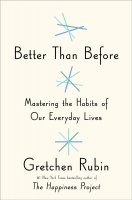 Better than Before: Mastering the Habits of Our Everyday Lives by Gretchen Rubin (Crown Publishers, 2015)
Better than Before: Mastering the Habits of Our Everyday Lives by Gretchen Rubin (Crown Publishers, 2015)
This book started slowly for me, though not for bad reasons: I spent too much time (and not enough) trying to answer some of the self-examination questions Rubin asks at the beginning. It might be useful to revisit them when I'm feeling less time pressure (as if that day will ever come!). I was somewhat frustrated because she keeps dividing the world into categories—Are you an Upholder, a Questioner, an Obliger, or a Rebel? A Marathoner, Sprinter, or Procrastinator? A Finisher or an Opener?—and all too often I find myself a true mélange, which leaves me unable to get as much from her later prescriptions as I otherwise might. I bogged down again over her preoccupation with diet, and her low-carb proselytizing. Finally, however, I realized that my less-than-enthusiastic reaction was primarily due to the fact that not a lot of what Rubin says was new to me. Her Happiness Project books (my reviews are here and here) have many of the same characteristics I dislike, but they were so full of new and fascinating material that it didn't matter. This time it did—or perhaps I just shouldn't have been in such a hurry to read it. This was one of my "How Not to Read a Book" books, and I didn't have the time to festoon it with my usual sticky notes. Hence, you get no quotations.
Be that as it may, there's still much of value, and I may re-read Better than Before at a later date. For now I'll just mention the idea that struck me the most, and which I've already started to implement in daily life: One of the greatest advantages to establishing habits is that it frees us from much decision making. I'm one of those who feels as if I have only so much decision-making power each day, and anything that conserves that supply for more important decisions must be a useful tool.
Rubin's ideas about the usefulness of scheduling, accountability, monitoring, first steps, convenience/inconvenience, habit pairing, and the do's and don'ts of distraction and rewards are not new, but it's helpful to have them together in one book. Better than Before is a good accessory to the Tiny Habits approach.


